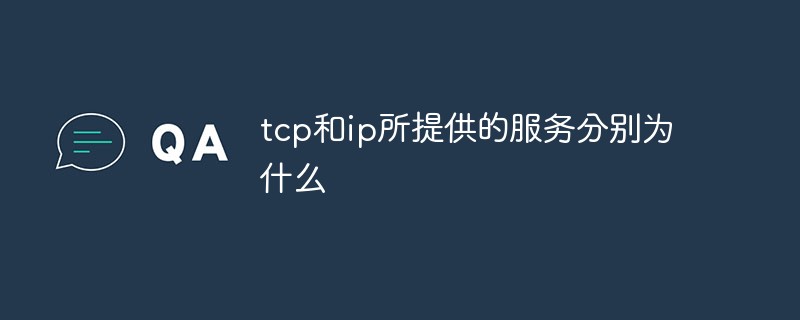
The services provided by tcp and ip are transport layer services and network layer services respectively. In the TCP/IP architecture, tcp refers to "Transmission Control Protocol", which is a protocol of the transport layer, so the services provided by tcp are transport layer services; and ip refers to "Internet Interconnect Protocol", which is a protocol of the network layer. protocol, so the services provided by ip are network layer services.

The operating environment of this tutorial: Windows 7 system, Dell G3 computer.
The services provided by tcp and ip are transport layer services and network layer services respectively.
TCP/IP architecture is divided into the following four layers:
1. Application layer, corresponding to the high level of the OSI reference model, provides users with various services required;
2. The transport layer provides end-to-end communication functions for application layer entities, ensuring the sequential transmission of data packets and the integrity of the data;
3. The network layer is responsible for the communication between adjacent nodes. Communication between;
4. Network interface layer, responsible for monitoring the exchange of data between the host and the network.
The services provided by TCP and IP are at the transport layer and the Internet layer respectively, which are transport layer services and network layer services.
TCP Protocol
Transmission Control Protocol (TCP, Transmission Control Protocol) is a connection-oriented, reliable, byte stream-based The Transport layer communication protocol is defined by the IETF's RFC 793.

TCP supplements the Internet Protocol (IP Protocol), which defines the IP address used to identify systems on the Internet, mainly ensuring end-to-end data transmission between different nodes . Internet Protocol provides instructions for transmitting data, while TCP creates connections and ensures data is delivered to the correct destination. These two protocols usually work together and are called the TCP/IP suite.
TCP works in conjunction with the Internet Protocol, which defines the logical location of remote nodes, while TCP transports and ensures data is delivered to the correct destination.
TCP is designed to accommodate a layered protocol hierarchy that supports multiple network applications. TCP is relied upon to provide reliable communication services between pairs of processes in a host computer connected to different but interconnected computer communication networks. TCP assumes that it can obtain simple, possibly unreliable datagram services from lower-level protocols. In principle, TCP should be able to operate on top of a variety of communications systems, from hardwired connections to packet-switched or circuit-switched networks.
IP Protocol
IP refers to the Internet Protocol, the abbreviation of Internet Protocol, which is the network layer in the TCP/IP system protocol. The purpose of designing IP is to improve the scalability of the network: first, to solve Internet problems and realize the interconnection of large-scale and heterogeneous networks; second, to separate the coupling relationship between top-level network applications and underlying network technologies to facilitate the two. Develop independently. According to the end-to-end design principle, IP only provides a connectionless, unreliable, best-effort packet transmission service to the host.
IP mainly includes three aspects: IP addressing scheme, packet encapsulation format and packet forwarding rules.
#Forwarding rules of IP packets
The router forwards only based on the network address. When an IP data packet is forwarded via a router, if the target network is directly connected to the local router, the data packet is delivered directly to the target host, which is called direct delivery; otherwise, the router looks up the routing information through the routing table and transfers the data packet to Specified next-hop router, this is called indirect delivery. In indirect delivery, if the router has a route to the target network in the routing table, it will deliver the data packet to the next-hop router specified in the routing table; if there is no route but there is a default route in the routing table, it will deliver the data packet. Gives the specified default router; if neither is present, the packet is dropped and an error is reported.
IP fragmentation
An IP packet may need to go through multiple different Physical network. Since the data frames of various networks have a maximum transmission unit (MTU) limit, for example, the MTU of an Ethernet frame is 1500; therefore, when the router is forwarding IP packets, if the size of the data packet exceeds the maximum size of the egress link, When transmitting units, the IP packet will be broken down into many fragments that are small enough to be transmitted on the target link. These IP fragments re-encapsulate an IP packet for independent transmission and are reassembled when it reaches the destination host.
IP packet structure
An IP packet consists of header and data. The first 20 bytes of the header are required by all IP packets and are also called fixed headers. Following the fixed part of the header are some optional fields, the length of which is variable.
For more related knowledge, please visit the FAQ column!
The above is the detailed content of What are the services provided by tcp and ip?. For more information, please follow other related articles on the PHP Chinese website!